Justin Taylor's Blog, page 160
May 2, 2013
An Interview with Larry Woiwode on “Words for Readers and Writers”
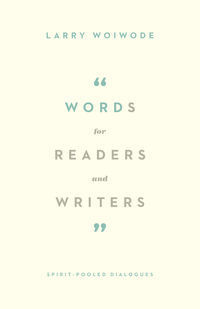 Larry Woiwode is an American original, a national treasure, a man of letters. His first novel, What I’m Going to Do, I Think (1969) was awarded the William Faulkner Foundation Award for the “best first novel of 1969. His next book, Beyond the Bedroom Wall, sold over a million copies and was a finalist for the National Book Award and the Book Critics Circle Award. He became a believer during the writing of this novel, and eventually embraced the Reformed understanding of the Christian faith.
Larry Woiwode is an American original, a national treasure, a man of letters. His first novel, What I’m Going to Do, I Think (1969) was awarded the William Faulkner Foundation Award for the “best first novel of 1969. His next book, Beyond the Bedroom Wall, sold over a million copies and was a finalist for the National Book Award and the Book Critics Circle Award. He became a believer during the writing of this novel, and eventually embraced the Reformed understanding of the Christian faith.
In this fascinating new interview with Books & Culture editor John Wilson asks Woiwode about his new book, Words for Readers and Writers: Spirit-Pooled Dialogues, a collection of 21 essays that he especially hopes will instruct and encourage young writers.
You can read online the introduction, table of contents, and two of the essays (“Using Words, a Continual Spiritual Exercise” and “Getting Words Plain Right to Publish”).
“Few writers can match Larry Woiwode for craft and care. Sentence by beautiful sentence he traces the lineaments of thought, feeling, and experience. He inhabits the roles that life has given him, as writer and critic, father and husband, and Christian, with a constant difficult grace. I admire his writing deeply; it is always gratifying to be in its presence.”
—Alan Jacobs, Clyde S. Kilby Professor of English, Wheaton College
“A book on craft, yes, but more a book on living, Larry Woiwode’s Words for Readers and Writers in my library sits between Flannery O’Connor’s Mystery & Manners and John Gardner’s On Becoming a Novelist. Not since O’Connor has a writer put the reader in such comfortable and uncomfortable places at the same time.”
—G. W. Hawkes, Professor of English, co-director of Creative Writing, Lycoming College; author, Spies in the Blue Smoke and Playing out of the Deep Woods
“The word ‘words’ and the name ‘Woiwode’ are only similar sounding but are practically synonymous. Who better to parse the subject of words than Larry Woiwode, one of our country’s ultimate wordsmiths?”
—John L. Moore, author, The Breaking of Ezra Riley, Take the Reins, and Bitter Roots
“I knew that I was in for a treat the moment I looked at the table of contents, which reads like a tempting menu of topics. When I started to read the essays I was captivated by the energy of Woiwode’s mind and even more by how widely read and broadly informed he is. To read this book is to receive a liberal education. I believe that this is one of Woiwode’s best books.”
—Leland Ryken, Professor of English, Wheaton College
“In Words for Readers and Writers, Larry Woiwode—one of our most compelling and important contemporary voices—illuminates his life and his experience as a writer-of-faith, as a writer within whom and within whose works a profound Christian belief resides. In these essays and interviews, Woiwode takes us into his interior life, offering artful meditations on the holy acts of reading and writing. Woiwode explores what it means to be a writer-in-Christ, to celebrate the durability and holiness of language, to work at that place where the imagination and the soul intersect and flower. We should listen earnestly to what Woiwode has to say.”
—Gregory L. Morris, Professor of American Literature, Penn State Erie; author, A World of Order and Light and Talking Up a Storm
“Why do you write? Where does it come from? What sort of life is it, anyway? We badger our writers with those questions certain that living that close to fire must surely have taught them something. Woiwode has been asked those questions many times, over the years, and this volume collects a vigorous, various set of answers. While settings and interlocutors shift, Woiwode’s core insight, quietly returned to, remains always the same. What is writing but faith expressing itself through love?—giving yourself over to that first stab of insight, spending yourself prodigiously for others, certain that the one who calls you has already given you all things. One can learn much here about reading and writing, but one can learn even more what it means to believe.”
—Thomas Gardner, Alumni Distinguished Professor of English, Virginia Tech; author, John in the Company of Poets: The Gospel in Literary Imagination
May 1, 2013
Lauren Chandler on Treasuring the Gospel in Your Home
 Lauren Chandler’s foreword to Gloria Furman’s excellent new book, Glimpses of Grace: Treasuring the Gospel in Your Home (which is on sale this week for 53% off a single copy, or 67% off three or more):
Lauren Chandler’s foreword to Gloria Furman’s excellent new book, Glimpses of Grace: Treasuring the Gospel in Your Home (which is on sale this week for 53% off a single copy, or 67% off three or more):
When you’re drowning, the last thing you need is a tutorial on five easy steps to swim like a fish. What you need, what you’re utterly desperate for, is something that will keep you afloat. Something that you can grab onto and not let go. Something that doesn’t need you to sustain it, but rather something that can bear the full weight of your desperation.
Overwhelming waves and deep waters can come in every shape and depth imaginable: a newborn baby, the loss of a job, a chronic illness, a move, a change in a friendship, terminal cancer, a wrestle with your faith, the death of a loved one, a new chapter of parenting, a season of singleness beyond what you’d imagined, more responsibility heaped on a plate already a mile high and even the bleak prospect of what seems to be decades of the mundane—endless loads of laundry, dirty dishes, dust-bunnied floors, and leaky faucet noses. All the places in which you feel in over your head.
Our human tendency is to ask, what steps do I need to take either to make this work or to make this go away? The proof is in the pages—web pages on how to make one’s self marketable (to a lifeless job market or to the dating people market). Books of pages line shelves in the local bookstore on what to eat to beat cancer, how to grieve a loss, how to make good kids, how to grow your own garden, raise your own chickens, sew your own clothes, feather your nest with flea market finds refurbished (by you, thanks to Pinterest), homeschool your kids, create a blog about it, and still have dinner steaming on the table when your husband gets home.
We do well to seek advice. This is wisdom. But there’s something to being at your wits’ end that begs for more than instruction. Psalm 107 illustrates a season in the storm. Men in ships doing business on great waters are literally struck by a tempest. Scripture says, “They reeled and staggered like drunken men and were at their wits’ end” (v. 27). Their response to being completely helpless was to cry out to the Lord. No how-tos, no cute preservers, but just an honest and urgent plea to be delivered from a situation that was more than they could navigate. What did the Lord do on their behalf? He showed them his steadfast love. He calmed the waters, hushed the sea, and brought them to their desired haven.
This is sustaining grace, this is the desired haven: to know his steadfast love that saves and keeps us. Glimpses of Grace is not a how-to. It is a true friend’s invitation to see and know the Lord’s steadfast love displayed in every wave, big and small. Gloria offers encouragement rooted in her personal experience and wisdom from saints who have weathered the storms decades and even centuries before us. May you catch glimpses of his steadfast love and find an anchor for your soul.
How Christianity Differs from Both Liberalism and Conservatism
Several years ago J. Budziszewski penned a complementary set of articles for First Things on “The Problem with Liberalism” and “The Problem with Conservatism.”
In these articles he identifies several traits of each ideology and contrasts them with the teaching of Christianity. I’ve reproduced the outlines below, with some of his introductory comments and conclusions. You can read both pieces to see his arguments in full.
Note two things by way of prefatory comment.
First, note that these are general summary statements. Not every “liberal” will own each thesis, and the same is true on the “conservative” side. But there are people out there who hold to the different principles mentioned, whether the belief is explicit or implicit. So don’t get hung up with the response, “I’m a conservative and I don’t hold to X,” instead of evaluating whether or not his description of the Christian contrast is accurate and compelling.
Second, just because because neither political liberalism nor political conservatism is the gospel, it does not follow there there is a moral equivalency between the two. I think it’s too easy to draw that conclusion in the name of loving the gospel. It can still be the case that the consequences of one can be worse than the other.
On to the summaries.
Budziszewski writes:
Even though I am not a duck, I will sometimes seem to quack like a duck. I cannot be a liberal and I cannot even be in strategic alliance with liberals, but I may from time to time find myself in tactical alliance with them—just as with conservatives—defending the cause of particular laws, precepts, or policies that they too approve, but for reasons of their own. To keep my head, I had better be clear about what those reasons are and how they differ from mine. So although we cannot ask whether Christians can or should be political liberals, we can and should ask what Christians are to think of liberalism.
By “liberal,” Budziszewski is here referring to the “contemporary variety of government-driven social reformism.”
Here is his thesis:
My thesis is that, even as worldly philosophies go, political liberalism is deeply flawed. We may best describe it as a bundle of acute moral errors, with political consequences that grow more and more alarming as these errors are taken closer and closer to their logical conclusions. I am not speaking of such errors as celebrating sodomy and abortion—for these are merely symptoms—but of their causes. Nor am I speaking of all their causes—for this would require reading hearts—but of their intellectual causes. I am not even speaking of all their intellectual causes—for these are too numerous—but of the most obvious. No claim is here made that every political liberal commits all the moral errors all the time. Nor do I claim that all the moral errors are logically compatible, so they even could all be committed all the time. Certain moral errors support certain others, but others are at odds, so they must be committed selectively. One must not expect logical coherence in moral confusion.
And here are the nine moral errors he identifies with political liberalism, contrasted with the biblical worldview:
Propitiationism: I should do unto others as they want. Christianity : I should do unto others as they need.
Expropiationism: I may take from others to help the needy, giving nothing of my own. Christianity : I should give of my own to help the needy, taking from no one.
Solipsism: Human beings make themselves, belong to themselves, and have value in and of themselves. Christianity : Human beings are made by God, belong to Him, and have value because they are loved by Him and made in His image.
Absolutism: We cannot be blamed when we violate the moral law, either because we cannot help it, because we have no choice, or because it is our choice. Christianity : We must be blamed, because we are morally responsible beings.
Perfectionism: Human effort is adequate to cure human evil. Christianity : Our sin, like our guilt, can be erased only by the grace of God through faith in Christ.
Universalism: The human race forms a harmony whose divisions are ultimately either unreal or unimportant. Christianity : Human harmony has been shattered by sin and cannot be fully healed by any means short of conversion.
Neutralism: The virtue of tolerance requires suspending judgments about good and evil. Christianity : The virtue of tolerance requires making judgments about good and evil.
Collectivism: The state is more important to the child than the family. Christianity : The family is more important to the child than the state.
The Fallacy of Desperate Gestures: “The perfectionist acts, at least in the beginning, from a desire to relieve someone else’s pain. The desperationist acts to relieve his own: the pain of pity, the pain of impotence, the pain of indignation. He is like a man who beats on a foggy television screen with a pipe wrench, not because the wrench will fix the picture but because it is handy and feels good to use.”
And here is his conclusion:
Here lies the power of political liberalism: Its moral errors are fortified with opiates. We may think that reality will break through the dream by itself, but reality is not self-interpreting; the causes by which errors are eventually dissipated and replaced by other errors are hidden in God’s Providence. All we can do is keep up the critique which is in the gospel, and in the meantime go on being Christians: our eyes lifted up not to the spectacular idol of political salvation, but to the Cross. Let those who will call this doing nothing; we know better.
On conservatism: Budziszewski is clear up front that not all of these errors apply equally to all conservatives. Rather he is identifying broad themes. Further, it helps to know that he is roughly defining a conservative as a person who “opposes the contemporary government-driven variety of social reformism in the name of some cherished thing which he finds that it endangers.”
Here is a short overview of his general perspective:
What then is a Christian to make of conservatism? The danger, it would seem, is not in conserving, for anyone may have a vocation to care for precious things, but in conservative ideology, which sets forth a picture of these things at variance with the faith. The same is true of liberalism. From time to time Christians may find themselves in tactical alliance with conservatives, just as with liberals, over particular policies, precepts, and laws. But they cannot be in strategic alliance, because their reasons for these stands are different; they are living in a different vision. For our allies’ sake as well as our own, it behooves us to remember the difference. We do not need another Social Gospel—just the Gospel.
Here are the eight moral errors, contrasted with the biblical vision:
Civil Religionism: America is a chosen nation, and its projects are a proper focus of religious aspiration. Christianity : America is but one nation among many, no less loved by God, but no more.
Instrumentalism: Faith should be used for the ends of the state. Christianity : Believers should be good citizens, but faith is not a tool.
Moralism: God’s grace needs the help of the state. Christianity : Merely asks that the state get out of the way.
Caesarism: The laws of man are higher than the laws of God. Christianity : The laws of God are higher than the laws of man.
Traditionalism: What has been done is what should be done. Christianity : Any merely human custom may have to be repented.
Neutralism: Everyone ought to mind his own business, therefore moral and religious judgments should be avoided. Christianity : While one ought to mind his own business, moral and religious judgments can never be avoided.
Mammonism: Wealth is the object of commonwealth, and its continual increase even better. Christianity : Wealth is a snare, and its continual increase even worse.
Meritism: I should do unto others as they deserve. Christianity : I should do unto others not as they deserve, but as they need.
Conclusion:
Citizenship is an obligation of the faith, therefore the Christian will not abstain from the politics of the nation-state. But his primary mode of politics must always be witness. It is a good and necessary thing to change the welfare laws, but better yet to go out and feed the poor. It is a good and necessary thing to ban abortion, but better yet to sustain young women and their babies by taking them into the fellowship of faith. This is the way the kingdom of God is built.
It is not by the world that the world is moved—yet how it pulls. Ah, God, help us let go of the heights and the depths, the thrones and dominions, the powers and principalities; to be not conservatives, nor yet liberals, but simply Christians. “Not by might, nor by power, but by my Spirit, says the Lord of Hosts.”
April 30, 2013
The Life and Ministry of Charles Spurgeon
Watch above as John Piper lectures at Reformed Theological Seminary (April 10, 2013) on the life and ministry of Charles Spurgeon. (You can find audio and the manuscript of an earlier edition of this talk here.)
Spurgeon’s life and thought seems strangely neglected by historians and theologians today. So I am very thankful that this September Christian Focus will be publishing Tom Nettles’ new biography, The Life and Ministry of Charles Spurgeon. Here are some early reviews:
“Charles Spurgeon is a mountain—a massive figure on the evangelical landscape. Tom Nettles now helps us to understand Charles Haddon Spurgeon as a man, a theologian, and one of the most influential pastors in church history. Nettles takes us into the heart of Charles Spurgeon’s conviction and his pastoral theology. This is a book that will encourage, educate, and bless its readers.”
—R. Albert Mohler, President, The Southern Baptist Theological Seminary, Louisville, Kentucky
“While numerous biographies of Spurgeon have been published over the decades, Spurgeon’s thought normally receives short shrift from his biographers. This is why this new biography is so important. By focusing on Spurgeon’s memoirs and published articles, Tom Nettles has filled an important gap in scholarship related to Spurgeon with this exhaustive intellectual biography of the Prince of Preachers. Many pastors and other casual readers will be encouraged by Spurgeon’s commitment to a high view of Scripture and historic Baptist orthodoxy from a Reformed perspective. Scholars will be forced to reckon with Spurgeon the theologian as they pursue their own studies of the famed Victorian pastor.”
—Nathan A. Finn, Associate Professor of Historical Theology and Baptist Studies, The Southeastern Baptist Theological Seminary, Wake Forest, North Carolina
“What Nettles makes plain is that for Spurgeon, all theology is pastoral theology. I cannot recommend this book highly enough. It should be widely distributed by all who love the gospel of God’s grace that Spurgeon preached. Every pastor, ministerial student and those who work to train men for the ministry should carefully learn from the life and labors of Charles Haddon Spurgeon as Tom Nettles elucidates them. Nearly everyone who knows of Spurgeon admires him for his great accomplishments. Nettles helps us understand the theological underpinnings of those accomplishments. In doing so, the author, like his subject, has served the church well.”
—Tom Ascol, Pastor, Grace Baptist Church, Cape Coral, Florida
“Fresh and unique, this book will be enjoyable to laymen, profitable to pastors, and indispensable for scholars. Nettles’ volume now takes an honored place among the most valuable of all resources pertaining to the Prince of Preachers.”
—Don Whitney, Associate Professor of Biblical Spirituality, The Southern Baptist Theological Seminary, Louisville, Kentucky
“With the publication of Living by Revealed Truth, Tom Nettles has provided his readers with the premier interpretive account of Charles Haddon Spurgeon. Evidencing decades of serious engagement with this great Baptist leader of the nineteenth century, Nettles has given us an immense and monumental portrait of almost every aspect of the life of “the prince of preachers,” including not only his numerous writings and multi-faceted ministry, but also his leadership practices and personal challenges. Educational, edifying, and enjoyable to read, this massive work is a masterful contribution to Baptist history and Christian biography.”
—David S. Dockery, President, Union University, Jackson, Tennessee
“Charles Haddon Spurgeon was the greatest preacher of the nineteenth century in England and probably the whole world. The pungent and passionate sermons of the Baptist pastor brought home the gospel message to the hearts of his numerous hearers and more numerous readers. Tom Nettles has retold Spurgeon’s life as a warm admirer, but he is careful to rest his judgements on detailed evidence. In particular The Sword and the Trowel, the magazine Spurgeon edited as pastor of the Metropolitan Tabernacle in London, is used as a quarry for an abundance of fresh material. Consequently this biography casts new light on Spurgeon’s life, ministry and theology.”
—David Bebbington, Professor of History, University of Stirling, Stirling
“Despite his ongoing popularity, Charles Spurgeon has only recently begun to attract the serious attention he deserves. Tom Nettles’ work now makes a major contribution to this growing appreciation of the man and his ministry. Mining neglected but important sources, he has given sharper definition to our picture of Spurgeon, and produced a highly stimulating and readable account.”
—Michael Reeves, Head of Theology, UCCF
“It has long been my conviction that, despite the goodly number of Spurgeon biographies that have been written since the Baptist preacher’s death in 1892, there really is lacking a definitive study that not only takes account of his remarkable ministry and the inspiring details of his life, but also adequately deals with the theology of the man. Finally, in this work by my dear colleague Tom Nettles, a sort of magnum opus upon which he has labored for many years, is justice done to not only Spurgeon the man and preacher, but also to Spurgeon the theologian. Here is an ‘all-round’ study of Spurgeon that provides us with a fully reliable, substantial examination of an extremely important figure in the life of Victorian Evangelicalism and the world of that era.”
—Michael A. G. Haykin, Professor of Church History and Biblical Spirituality, The Southern Baptist Theological Seminary, Louisville, Kentucky
“One of those rare gems of Christian biography: it places in your hands the life a great man, written by an outstanding historical theologian. The combination brings Charles Spurgeon’s life and thought to life. Tom Nettles’s portrait of Spurgeon is eminently personal, historically vivid and theologically rich. I recommend it to anyone interested in seeing how theology and ministry, gospel and life, can unite in a single narrative of a life lived for the glory of God.”
—Robert Caldwell, Assistant Professor of Church History, Southwestern Baptist Theological Seminary, Forth Worth, Texas
“Nettles gives the reader insights into Spurgeon’s views on theology, the ministry, and church life that will pay rich dividends to any who will take the time to read this compelling story. If a minister reads only one biography of the great preacher, let it be this one!”
—Jeff Straub, Professor of Historical Theology, Central Baptist Theological Seminary, Plymouth, Minnesota
“Readers are inspired to holiness of life, faithfulness in Christ’s service, and perseverance in godliness by the moving account of this great Victorian evangelist who held and maintained through his preaching and pastoral ministry endeavors the great truths generally known as ‘the doctrines of grace.’”
—C. Berry Driver Jr., Dean of Libraries, Southwestern Baptist Theological Seminary, Fort Worth, Texas
“Nettles presents the ministerial brilliance of the ‘Prince of Preachers,’ whose pastoral labors transcend generations down to this present hour. Revered by many as the greatest preacher since the apostle Paul, readers will be encouraged and edified by this engaging account of Spurgeon’s life and ministry.”
—Steven J. Lawson, Senior Pastor, Christ Fellowship Baptist Church, Mobile, Alabama
For those who are interested, here is an hour-long docu-drama on the life of C. H. Spurgeon: The People’s Preacher:
Agassiz and the Fish
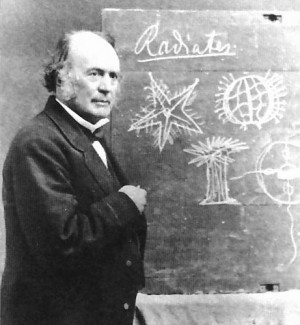
Louis Agassiz (1807-1873)
Do you know the story of “Agassiz and the Fish”? It’s a powerful lesson on the necessity of painstaking observation—staring at and studying the reality before our eyes—especially if you apply it to the idea of studying the word of God.
I first heard it in the late 1990s at Bethlehem Baptist Church under Tom Steller, who first learned it in the mid-1970s at Bethel College under John Piper, who first learned it in the late 1960s at Fuller Theological Seminary under Dan Fuller, who first learned it in the mid 1940s at Princeton Theological Seminary under Howard Kuist. (Sorry—I don’t know where Kuist first heard it!)
Agassiz was the founder of the Harvard Museum of Comparative Zoology and a Harvard professor in the 19th century. The following account was written by one of his students, Samuel H. Scudder, under the title “Agassiz and the Fish, by a Student” (American Poems, 3rd ed. [Boston: Houghton, Osgood & Co., 1879], pp. 450-54). Thanks to David Howard’s site for the reproduction of the original story.
Agassiz and the Fish
by a Student
It was more than fifteen years ago that I entered the laboratory of Professor Agassiz, and told him I had enrolled my name in the scientific school as a student of natural history. He asked me a few questions about my object in coming, my antecedents generally, the mode in which I afterwards proposed to use the knowledge I might acquire, and finally, whether I wished to study any special branch. To the latter I replied that while I wished to be well grounded in all departments of zoology, I purposed to devote myself specially to insects.
“When do you wish to begin?” he asked.
“Now,” I replied.
This seemed to please him, and with an energetic “Very well,” he reached from a shelf a huge jar of specimens in yellow alcohol.
“Take this fish,” he said, “and look at it; we call it a Haemulon; by and by I will ask what you have seen.”
With that he left me. . . . I was conscious of a passing feeling of disappointment, for gazing at a fish did not commend itself to an ardent entomologist. . . . .
In ten minutes I had seen all that could be seen in that fish, and started in search of the professor, who had, however, left the museum; and when I returned, after lingering over some of the odd animals stored in the upper apartment, my specimen was dry all over. I dashed the fluid over the fish as if to resuscitate it from a fainting-fit, and looked with anxiety for a return of a normal, sloppy appearance. This little excitement over, nothing was to be done but return to a steadfast gaze at my mute companion. Half an hour passed, an hour, another hour; the fish began to look loathsome. I turned it over and around; looked it in the face—ghastly; from behind, beneath, above, sideways, at a three-quarters view—just as ghastly. I was in despair; at an early hour, I concluded that lunch was necessary; so with infinite relief, the fish was carefully replaced in the jar, and for an hour I was free.
On my return, I learned that Professor Agassiz had been at the museum, but had gone and would not return for several hours. My fellow students were too busy to be disturbed by continued conversation. Slowly I drew forth that hideous fish, and with a feeling of desperation again looked at it. I might not use a magnifying glass; instruments of all kinds were interdicted. My two hands, my two eyes, and the fish; it seemed a most limited field. I pushed my fingers down its throat to see how sharp its teeth were. I began to count the scales in the different rows until I was convinced that that was nonsense. At last a happy thought struck me—I would draw the fish; and now with surprise I began to discover new features in the creature. Just then the professor returned.
“That is right,” said he, “a pencil is one of the best eyes. I am glad to notice, too, that you keep your specimen wet and your bottle corked.”
With these encouraging words he added—
“Well, what is it like?”
He listened attentively to my brief rehearsal of the structure of parts whose names were still unknown to me; the fringed gill-arches and movable operculum; the pores of the head, fleshly lips, and lidless eyes; the lateral line, the spinous fin, and forked tail; the compressed and arched body. When I had finished, he waited as if expecting more, and then, with an air of disappointment:
“You have not looked very carefully; why,” he continued, more earnestly, “you haven’t seen one of the most conspicuous features of the animal, which is as plainly before your eyes as the fish itself. Look again; look again!” And he left me to my misery.
I was piqued; I was mortified. Still more of that wretched fish? But now I set myself to the task with a will, and discovered one new thing after another, until I saw how just the professor’s criticism had been. The afternoon passed quickly, and when, towards its close, the professor inquired,
“Do you see it yet?”
“No,” I replied. “I am certain I do not, but I see how little I saw before.”
“That is next best,” said he earnestly, “but I won’t hear you now; put away your fish and go home; perhaps you will be ready with a better answer in the morning. I will examine you before you look at the fish.”
This was disconcerting; not only must I think of my fish all night, studying, without the object before me, what this unknown but most visible feature might be, but also, without reviewing my new discoveries, I must give an exact account of them the next day. I had a bad memory; so I walked home by Charles River in a distracted state, with my two perplexities.
The cordial greeting from the professor the next morning was reassuring; here was a man who seemed to be quite as anxious as I that I should see for myself what he saw.
“Do you perhaps mean,” I asked, “that the fish has symmetrical sides with paired organs?”
His thoroughly pleased, “Of course, of course!” repaid the wakeful hours of the previous night. After he had discoursed most happily and enthusiastically—as he always did—upon the importance of this point, I ventured to ask what I should do next.
“Oh, look at your fish!” he said, and left me again to my own devices. In a little more than an hour he returned and heard my new catalogue.
“That is good, that is good!” he repeated, “but that is not all; go on.” And so for three long days, he placed that fish before my eyes, forbidding me to look at anything else, or to use any artificial aid. “Look, look, look,” was his repeated injunction.
This was the best entomological lesson I ever had—a lesson whose influence was extended to the details of every subsequent study; a legacy the professor has left to me, as he left it to many others, of inestimable value, which we could not buy, with which we cannot part. . . .
The fourth day a second fish of the same group was placed beside the first, and I was bidden to point out the resemblances and differences between the two; another and another followed, until the entire family lay before me, and a whole legion of jars covered the table and surrounding shelves; the odor had become a pleasant perfume; and even now, the sight of an old six-inch worm-eaten cork brings fragrant memories!
The whole group of Haemulons was thus brought into review; and whether engaged upon the dissection of the internal organs, preparation and examination of the bony framework, or the description of the various parts, Agassiz’s training in the method of observing facts in their orderly arrangement, was ever accompanied by the urgent exhortation not to be content with them.
“Facts are stupid things,” he would say, “until brought into connection with some general law.”
At the end of eight months, it was almost with reluctance that I left these friends and turned to insects; but what I gained by this outside experience has been of greater value than years of later investigation in my favorite groups.
April 29, 2013
Two New Books on Christ and the City
In the video above three wise pastors—one on the West Coast (Justin Buzzard in San Jose), one in the Midwest (Jon Dennis in Chicago), one on the East Coast (Stephen Um in Boston)—talk about what God is doing in cities today and why it matters from a biblical, cultural, sociological, and theological perspective. The three of them have brand-new books on the subject.
Dennis is the author of Christ + City: Why the Greatest Need of the City Is the Greatest News of All, and Buzzard and Um are the co-authors of Why Cities Matter: To God, the Culture, and the Church.
Here are some endorsements for Dennis’ book:
 “Thoroughly biblical in its scope and treatment, Jon Dennis has gifted the people of God with a manifesto that will inspire the reader to be a part of what God is doing in cities. Incredibly timely, astoundingly pertinent, and convincingly prophetic, this is a book you will want to come back to over and over again.”
“Thoroughly biblical in its scope and treatment, Jon Dennis has gifted the people of God with a manifesto that will inspire the reader to be a part of what God is doing in cities. Incredibly timely, astoundingly pertinent, and convincingly prophetic, this is a book you will want to come back to over and over again.”
—Bryan Loritts, Lead Pastor, Fellowship Memphis, Memphis, Tennessee
“More and more people have zero connection to Christ and his church. And, the vast majority of people who would check ‘nothing’ under religion overwhelmingly live in urban areas. Christ + City gives us a map to empower local churches who develop disciples who engage their cities with the love of Christ.”
—Darrin Patrick, Pastor, The Journey, St. Louis, Missouri; author, For the City and Church Planter: The Man, the Message, the Mission
“Jon Dennis is a pastor, mentor, and visionary leader who has embraced Christ’s call to the city. His dynamic ministry in Chicago and his outreach to other global cities across several continents give him a deep understanding of the opportunity that today’s urban generation has to reach the city for Christ. In this pervasively gospel-centered book, Dennis combines the faithful exposition of central biblical texts with wise pastoral guidance to help people who live, work, serve, and worship in urban communities to honor God’s redemptive purposes for the city.”
—Philip Graham Ryken, President, Wheaton College
You can read the introduction and the first chapter online for free here. And for the Buzzard and Um volume:
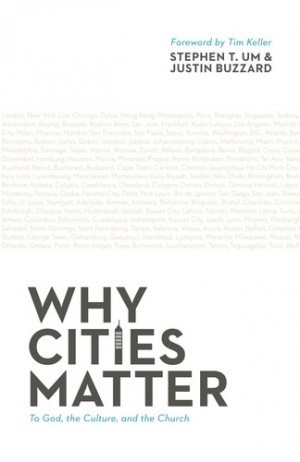 “One can’t effectively plant or pastor a church in an urban context without first developing a theology of cities. This book will be an essential guide to discerning leaders who know that cities matter and want to engage those cities well.”
“One can’t effectively plant or pastor a church in an urban context without first developing a theology of cities. This book will be an essential guide to discerning leaders who know that cities matter and want to engage those cities well.”
—Ed Stetzer, President, LifeWay Research; author, Subversive Kingdom
“Recent years have witnessed a torrent of books on urbanization and on urban ministry. Many of these are specialist sociological studies; others are ‘how to’ manuals so comprehensive that the Spirit of God could walk out and we’d never miss him. What has been lacking is a short, reasonably comprehensive, impassioned, and simply written survey of the trends and issues, combined with unwavering commitment to the eternal gospel and a transparent love for the city. Whether or not you agree with all its details, this book supplies what has been lacking. Written by two younger pastors on opposite sides of the country who share their devotion to Christ and their years of fruitful ministry, this book is neither sociology nor manual (though it has some features of both), but a clarion call to Christians to look at cities with fresh eyes and cry, ‘Give me this mountain!’”
—D. A. Carson, Research Professor of New Testament, Trinity Evangelical Divinity School
“Stephen Um and Justin Buzzard have done the church a great service in providing a clear and compelling argument not only for the importance of cities in our times, but more especially why cities matter to the church. They do a terrific job in teasing out a rich biblical theology of cities that roots their cultural analysis in a thoughtful and faithful framework. After reading the book, I wanted to call a real estate agent and tell them to find me a place in the city. It is not only where the ‘cultural action’ is today, but also where there is such a desperate need for thoughtful, faithful, and vibrant ministry. Um and Buzzard show us that cities are not to be shunned but loved with the full breath of the Gospel. You will not be able to think about cities in the same old ways after reading this book.”
—Richard Lints, Vice President for Academic Affairs, Gordon-Conwell Theological Seminary
You can read Tim Keller’s foreword and chapter 1 online for free here.
The Decline of Western Civilization, 140 Characters at a Time
 It’s worth reading this week’s Weekly Standard cover story by Matt LaBash, a biting but insightful lampooning of the culture behind Twitter and what goes on at conferences like SXSW. Here is an excerpt:
It’s worth reading this week’s Weekly Standard cover story by Matt LaBash, a biting but insightful lampooning of the culture behind Twitter and what goes on at conferences like SXSW. Here is an excerpt:
If you haven’t gathered by now, I’m not a Twitter fan. In fact, I outright despise the inescapable microblogging service, which nudges its users to leave no thought unexpressed, except for the fully formed ones (there’s a 140-characters-per-tweet limit). I hate it not just because the Twidiocracy constantly insists I should love it, though that certainly helps. Being in the media profession (if “profession” isn’t overstating things), where everyone flocked en masse to the technology out of curiosity or insecurity or both, I’ve hated it reflexively since its beginning. But with time’s passage and deliberation, I’ve come to hate it with deeper, more variegated richness. I hate the smugness of it, the way the techno-triumphalists make everyone who hasn’t joined the Borg feel like they’ve been banished to an unpopulated island, when in fact the numbers don’t support that notion. . . .
I hate the way Twitter transforms the written word into abbreviations and hieroglyphics, the staccato bursts of emptiness that occur when Twidiots who have no business writing for public consumption squeeze themselves into 140-character cement shoes. People used to write more intelligently than they speak. Now, a scary majority tend to speak more intelligently than they tweet. . . .
I hate the way Twitter turns people into brand managers, their brands being themselves. It’s nearly impossible now to watch television news without an anchor imploring you to “follow me on Twitter,” even as you’re already following him on television. You couldn’t do this much following in the physical world without being slapped with a restraining order.
Though I’ve just catalogued much to hate about Twitter, there’s plenty more to hate about Twitter. I hate that Twitter makes the personal public. That conversations between two intimates that formerly transpired in person or by email become conversations between two intimates for the benefit of their followers. I’ve actually been to lunch with people who have tweeted throughout, unbeknownst to me. (The fact that they only looked up from their iPhone twice in two hours might’ve been a tipoff. Though that’s pretty much par for the course, even with untweeted lunches these days.) . . . .
A technology that incentivizes its status-conscious, attention-starved users to yearn for ever more followers and retweets, Twitter causes Twidiots to ask one fundamental question at all times: “How am I doing?” That’s not a question most people can resist asking, even in their offline lives, but on Twitter, where tweeters are publicly judged by masses of acquaintances and strangers alike, the effect tends to be intensified. Even the most independent spirit becomes a needy member of the bleating herd. It’s the nerd incessantly repeating what the more popular kids say. It’s the pretty girl, compulsively seeking compliments.
As a friend of mine says, “It’s addictive and insidious. I see it even with smart people who ought to know better but can’t help themselves. They give wildly disproportionate weight to the opinions they read on Twitter, mostly because they’re always reading Twitter. Which fills them with anxiety, distorts their perceptions, and makes it almost impossible for them to take the long view on anything. Every crisis is huge, ominous, and growing. Every attack requires an immediate response.”
You can read the whole thing here. But permit me just one more quote, which has implications for how we as Christians think about ourselves and our technological culture:
Evan Fitzmaurice, an Austin-based lawyer and longtime friend who until recently was the Texas Film Commissioner, has attended many a SXSW. He tells me one night over dinner that while he’s wired to the hilt (“I’ve gotta connect to the Matrix”), he sees the downside of perpetual connectedness. “You’re truncating natural thought. Things don’t gestate anymore. It’s instantaneous, without the benefit of reflection. And everything’s said at volume 10. Nothing’s graduated anymore. It’s a clamor.” Though not religious himself, he says what I witness at SXSW would be recognized by any religious person. “They’re trying to supplant deliverance and redemption through religion with civil religion and technological redemption—the promise of a sublime life on a higher plane.”
April 26, 2013
25 Good Answers to 25 Hard Questions
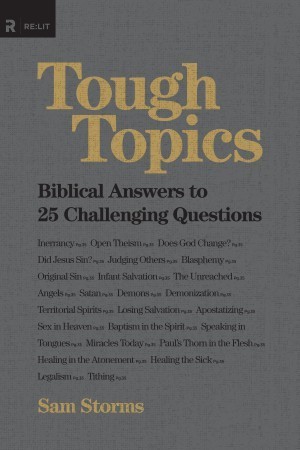 Sam Storms’ new book is called Tough Topics: Biblical Answers to 25 Challenging Questions. Here they are:
Sam Storms’ new book is called Tough Topics: Biblical Answers to 25 Challenging Questions. Here they are:
1 Is the Bible Inerrant?
2 What Is Open Theism?
3 Does God Ever Change His Mind?
4 Could Jesus Have Sinned?
5 What Did Jesus Mean When He Said, “Judge Not, that You Be Not Judged”?
6 What Is Blasphemy of the Holy Spirit?
7 Does the Bible Teach the Doctrine of Original Sin?
8 Are Those Who Die in Infancy Saved?
9 Will People Be Condemned for Not Believing in Jesus though They’ve Never Heard His Name?
10 What Can We Know about Angels?
11 What Can We Know about Satan?
12 What Can We Know about Demons?
13 Can a Christian Be Demonized?
14 Does Satan Assign Demons to Specific Geopolitical Regions?
Are There Territorial Spirits?
15 Can Christians Lose Their Salvation?
16 Does Hebrews Teach that Christians Can Apostatize?
17 Will There Be Sex in Heaven?
18 Are Miraculous Gifts for Today?
19 What Is Baptism in the Spirit, and When Does It Happen?
20 Should All Christians Speak in Tongues?
21 What Was Paul’s Thorn in the Flesh?
22 Is There Healing in the Atonement?
23 Why Doesn’t God Always Heal the Sick?
24 What Is Legalism?
25 Are Christians Obligated to Tithe?
One distinctive of the book is that the answers are not short, pithy summaries. Storms treats the questions with respect and gives in-depth answers based upon God’s Word.
By the way, don’t feel badly if you turn to chapter 17 first. Storms writes:
My guess is that when you first picked up this book, scanned the table of contents to see what tough topics I planned on addressing, and saw the title to this chapter, you turned here first, ignoring questions about blasphemy of the Holy Spirit and whether you should tithe! I know human nature well enough (including myself!) to realize that the question of whether there will be sex in heaven is of far more interest than any or all of the other topics this book examines. So don’t feel bad or guilty if this is the first chapter you read. Trust me, you’re in good company!
Gregg Allison of Southern Seminary writes about the book:
Let’s face it, the church has not always done the best possible job at fielding the hard questions posed to it by both skeptics and members.
In the case of the first group, skeptics end up discounting Christianity, dismissing it as irrational, head-in-the-sand religious fanaticism.
In the case of the second group, members become frustrated with the Christian faith and often drift away from what they have found to be a shallow, inconsistent, and quite unsatisfying worldview.
Sam Storms is a leader whom the Lord has wonderfully gifted not only to answer the tough questions, but also to provide an accessible resource for Christian leaders to be better prepared to engage skeptics and church members who wrestle with these issues rather than to rebuff them and discount their difficulties.
Sam’s passion is to deal with twenty-five of the most challenging questions you will ever face, and to do it in such a way that you become convinced of the answers and are prepared to offer help to others who face them as well.
He accomplishes this goal, not by offering his own good ideas and the best of human counsel, but by relying on the wisdom of God as found in Scripture.
You can download an excerpt of the book, or browse it below:
5 Things to Understand about Pop Culture
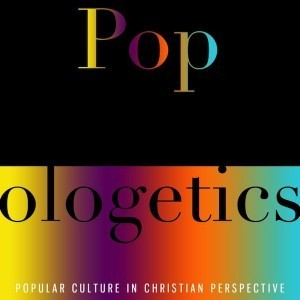 Ted Turnau, author of Popologetics: Popular Culture in Christian Perspective, writes in Tabletalk on five ways to understand and therefore engage popular culture:
Ted Turnau, author of Popologetics: Popular Culture in Christian Perspective, writes in Tabletalk on five ways to understand and therefore engage popular culture:
At its heart, popular culture is about worship.
Every piece of popular culture is a complicated mixture of good and bad, truth and lies, grace and idolatry.
Popular culture uses that grace to promote idols.
The gospel delivers just where idols default on their promises.
Not every piece of popular culture is appropriate for every Christian.
You can read the whole thing here.
Is There a Distinctively “Christian” Way to Be a Bus Driver?
 In addressing this question, I decided to give the ubiquitous “Christian plumber” a break. He always shows up in this discussion for some reason. So we’ll let the Christian bus driver sit behind the wheel today.
In addressing this question, I decided to give the ubiquitous “Christian plumber” a break. He always shows up in this discussion for some reason. So we’ll let the Christian bus driver sit behind the wheel today.
I wonder if the framing of this question in this way can at times reinforce ambiguity. My sense is that often a singular question is being asked but multiple questions are being answered. The result is more confusion than clarity.
Below is an attempt to unpack the issue a bit. I don’t pretend to have all the answers, so I welcome your own contribution and push-back in the comments section below.
Does the Bible teach how to be a bus driver?
No. For the most part, the Bible does not provide anything like a manual for the specific skills of a vocation. The Bible teaches on the nature of work, the purpose of work, and the manner of work, but it does not get into many specifics tasks with respect to many vocations.
Does the Bible teach how to be a Christian bus driver?
Of course. The Bible teaches that as Christians we should function within our God-ordained vocations (i.e., legitimate callings) (1) from biblical foundations, (2) with biblical motives, (3) according to biblical standards, and (4) aiming at biblical goals. These are the necessary and sufficient conditions for Christian virtue.
Faith working through love—before God and for our neighbor—is essential for virtuous action in our various vocations (1 Corinthians 13; Luke 10:27; Gal. 5:6, etc.). All things are to be done for God’s glory in accordance with his revealed will (1 Cor. 10:31). We are to work heartily unto God, not man, knowing that ultimately we are serving Christ before we serve our boss or our customer (Col. 3:23-24). We work in imitation of our creative, working God, and we work from a position of divine acceptance and not for a position of justification before him.
Is being a non-Christian bus driver inherently sinful?
It depends on what we mean here.
The vocation itself is a legitimate calling, sanctioned by God.
But one’s spiritual condition is not irrelevant in God’s evaluation of the proper way to fulfill a vocation. The Bible teaches that “without faith it is impossible to please [God]” (Heb. 11:6) and that “whatever does not proceed from faith is sin” (Rom. 14:23); therefore, any vocational pursuit devoid of genuine Christian faith is ultimately marked by sin and is finally displeasing to God. (The Westminster Confession of Faith 16.7 is helpful on this.) Their work is used by God but not fully pleasing to God.
Can a non-Christian be a good bus driver?
Yes, by common grace one can fulfill the earthly (i.e., non-eternal) standards of a vocation (e.g., safe driving, punctuality, cheerfulness, lack of external vice, etc). But the non-Christian will ultimately lack godly foundations, motives, goals, and standards—so even what looks “good” will not be Godward.
External virtue requires borrowing capital from the Christian worldview, and the two will often look similar from a superficial perspective. To make matters worse, sometimes this non-Christian borrowing can look more compelling than a Christian’s inconsistent or misguided efforts (e.g., beautiful art by a non-Christian vs. schlock art by a Christian).
Is a Christian necessarily a better bus drive than a non-Christian?
No. Christians are justified (uncondemned because of being clothed in the righteousness of Christ) but indwelling, entangling sin still remains. That means that before glorification Christians will never have pure goals, motives, or standards. A non-Christian may achieve a higher degree of competency in his or her vocation than a Christian—though this should not be the case. Sometimes this is a result of the non-Christian’s idolatry (achieving skills and competency at the expense of God and family and friendship and service); at other times a non-Christian will simply have more natural gifting from God for a particular vocation (e.g., a bus driver with better eyesight, superior reflexes, driving skills, experience, etc.)
Is there a distinctively Christian way to think about the particulars of each vocation?
Yes, I believe that there is. My sense is that the more intellectual and aesthetically oriented the vocation, the more work has already been done on a distinctively Christian approach. This is, in my part, because the contrast will be more wide-ranging and apparent and because the Bible seems to have more to say directly about these areas. I’m thinking, for example, of areas like philosophy, education, and politics. (For some examples, see Alvin Plantinga’s “Advice to Christian Philosophers,” or the books in the Reclaiming the Christian Intellectual Tradition series.) The same would be true for aesthetics, as in music, fine arts, and design. It can be more difficult to see in areas oriented toward manual labor. But there is still much work that can be done in these areas. One of the problems is that intellectuals and philosophers are more inclined to know and study areas they are more interested in, and therefore other vocations become neglected in terms of analysis.
Those interested in exploring this further may want to check out Vern Poythress’s ongoing labors at reforming academic disciplines from a relentless pursuit of Trinitarian implications. Thus far he has worked through the subject matters of science, language, sociology, and logic (with works on philosophy, mathematics, chance and probability, and hermeneutics forthcoming).
Also of interest should be James Bratt’s new biography of Abraham Kuyper, being hailed as the definitive work on his transformative thought. As Mark Noll notes, “Attentive readers of this landmark biography . . . should . . . be in a much better position to reflect on vital questions of Christianity and education, church and state, Christian universalism and Christian particularism, and many more that remain of first-order importance still today, nearly a century after Kuyper passed away.”
(For the record, I don’t think one needs to be “Neo-Kuyperian” to benefit from and appropriate many of Kuyper’s insights, or do learn from his shortcomings. As Mike Horton notes, there is nothing in a “two-kingdom” approach to Christ and culture that should prevent one from affirming a distinctively Christian way of fulfilling vocations.)
So there you have it. One big general question, and my attempt to unpack what may lie behind it. But oh how much more could be said!
Justin Taylor's Blog
- Justin Taylor's profile
- 44 followers



